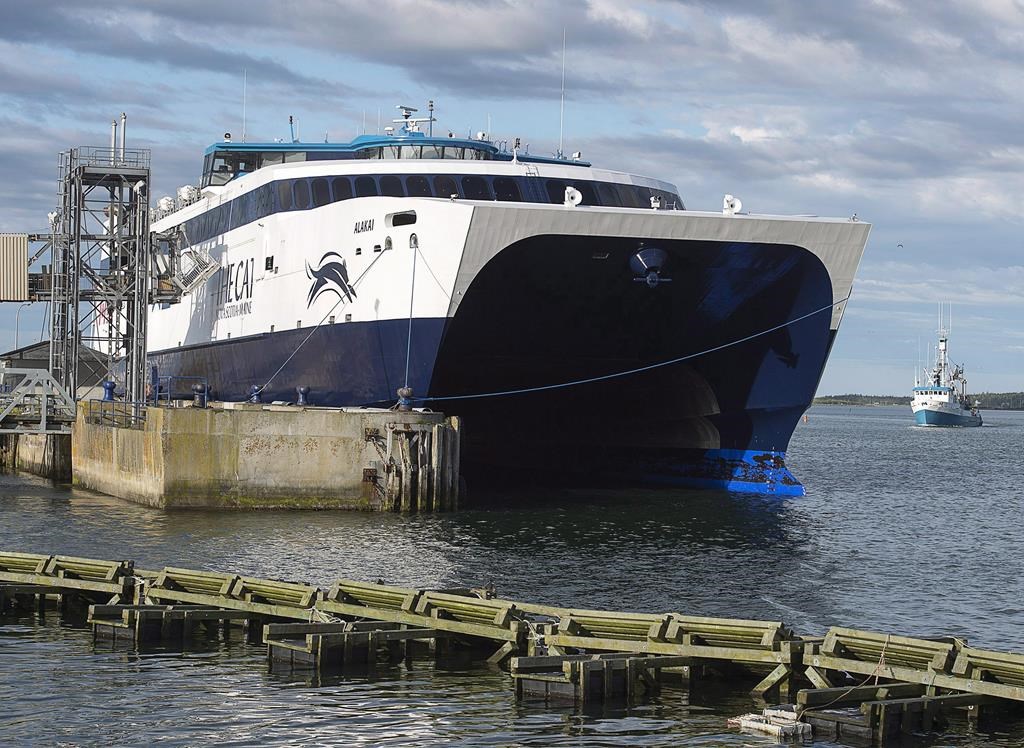Bay Ferries Ltd., the operators of a high-speed ferry service, have announced that they’ve officially signed a lease with Bar Harbor, Maine, clearing one of the final hurdles for the transition of the service’s American port of call.

The five-year lease of the ferry terminal in Bar Harbor has a guaranteed minimum annual rent of $264,000 and has a US$1-million guarantee, backed by the province of Nova Scotia.
The lease requires a “substantial renovation,” Bay Ferries said in a press release on Tuesday, which is being funded by the Government of Nova Scotia to the tune of approximately $5 million.
The figure is not disclosed in the release, but documents filed with the planning board in Bar Harbor reveal that cost estimates place the renovations between US$3.25 million and US$3.75 million.
READ MORE: Documents show N.S. taxpayers will pay up to $5M in renovations to Bar Harbor
The renovations include the demolition of existing buildings outside the terminal’s customs area, as well as several outbuildings and portions of the ferry terminal’s interior.
Equipment and technology required by US Customs and Border Protection (CBP), repairs to the existing terminal, a new fixed bridge and a floating ferry ramp are also being installed.
The documents filed with Bar Harbor include a letter from Bay Ferries, confirming that Nova Scotia will “ultimately bear responsibility for the costs of readying the Bar Harbor facility for ferry service.”
Those renovation fees come in addition to a subsidy provided to Bay Ferries by the province every year of the 10-year deal to provide the ferry service.
WATCH: Few answers even as Bay Ferries’ move to Bar Harbor steams ahead

The previous contract had been contingent on service between Yarmouth, N.S., and Portland, Maine and a new contract has yet to be signed, so it’s not clear if the fee will change.
The provincial subsidy for the 2018 sailing season was projected to be $10.9 million.
But a final move for the service, better known as the CAT, is not done yet. The deal, which has been in the works for at least a year, is still in flux due to a series of demands from CBP.
Along with technical sign-off on the ferry terminal, CBP says it would need to provide service 120 days a year and hire an additional five to seven officers to operate the terminal.
As a result, the customs agency is asking Bay Ferries to enter into an agreement that would see them foot the bill for refurbishing the terminal, as well as the salaries of the new employees.
CBP has previously expressed concern over Bay Ferries’ ability to get the upgrades done in time for the 2019 sailing season — slated to begin in June.
READ MORE: Tories sue Nova Scotia government over details of Yarmouth-Maine ferry fees
Marla MacInnis, a spokesperson for the Nova Scotia Department of Transportation and Infrastructure Renewal, says that they are “pleased that Bay Ferries is in a position to begin advertising and confident the move to Bar Harbor will provide greater stability for the service and lead to cost savings.”
However, Bay Ferries says they’ve asked the province to withhold publicly comment on the anticipated costs of the project as details are still being worked out.
“Within the next five weeks we will be in the position to release the estimate of the cost of this work,” said MacInnis.
The ferry operators anticipate that sales for this year’s sailing season will begin next Monday, with marketing campaigns set to ramp up in the coming months.




Comments